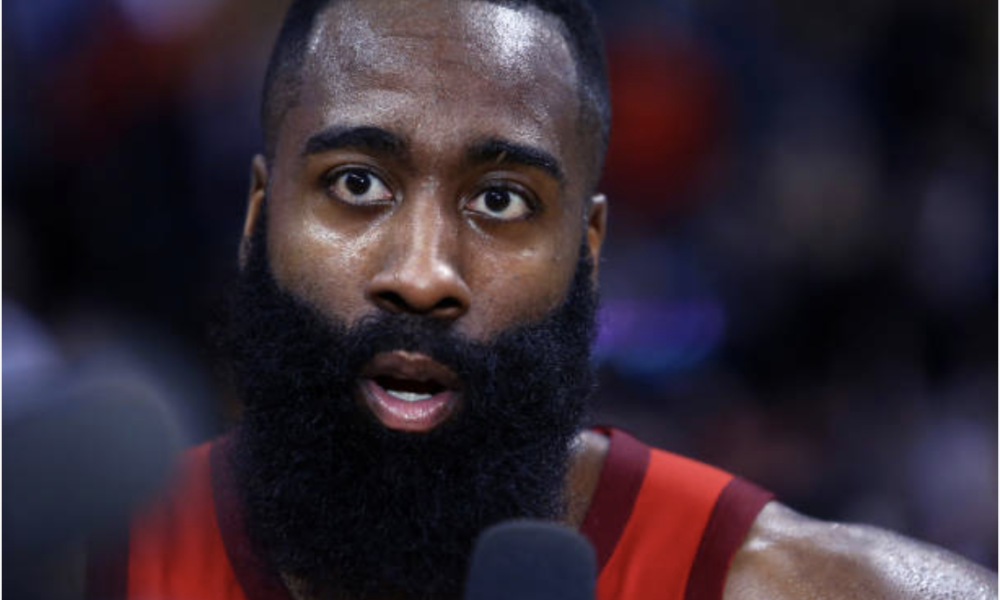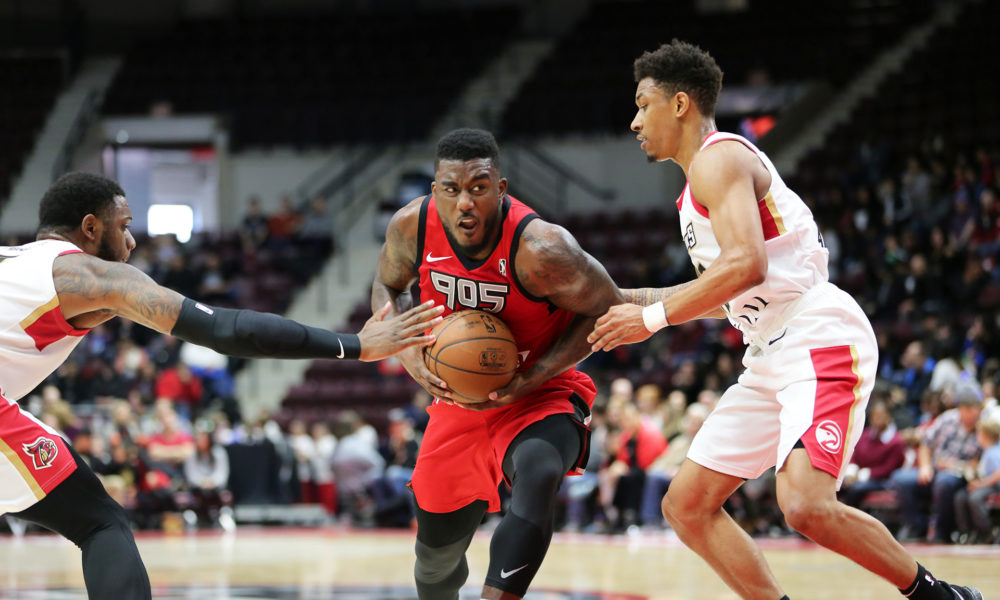A 34-14 blitzkrieg of a third quarter saved the Toronto Raptors from absolute humiliation, but the other quarters of Toronto’s 107-95 loss to the Houston Rockets were defined by missed execution and poor energy. Toronto was on the verge of stealing the game, but it was ultimately the bench – as has happened too often this season – that doomed Toronto’s chances.
“We’ve been through some ups and downs with our second unit this year, and we’re going to still keep working it and taking a look at it and I’m sure they’ll bounce back,” said Nick Nurse after the game. “I’m sure they’ll play better.”
If Pascal Siakam can be viewed as the bellwether of the Raptors’ emotional energy, then it was clear early that Toronto just didn’t have ‘it’ in the first half. Siakam too often jogged through offensive sets, and he didn’t beat Houston Rockets down the floor a single time. He even walked back to play defence a few times, which is a killer against a team as organized and deadly as the Rockets. Siakam’s early disinterest in what was supposed to be a marquee game was indicative of a general malaise that infected Toronto’s performance.
Instead of the lithe and elegant feline predator that Toronto has so frequently emulated since the Marc Gasol trade, the Raptors more closely mimicked the apathy of Henri the Existentialist Cat in the first half.
They didn’t have the execution, screwing up simple plays and missing open shots. (At one point in the second quarter, Jeremy Lin ran through an entire BLOB play before the referee even gave the ball to the inbounder.) They didn’t have the defensive focus, frequently losing track of shooters in the corner. (At one point, Kawhi Leonard forgot he was guarding PJ Tucker, who banked in a 3-pointer from the corner.) Most importantly, Toronto just didn’t have the effort.
“I think most of the time, it’s just effort,” said Siakam after the game. “The effort has to be better. At the end of the day, we just got to play harder.”
The second quarter began with Jeremy Lin and Norman Powell sharing initiation duties for a bench lineup. Even though Gasol and Siakam were on the floor, Lin and Powell seemed to launch the majority of the shots. Lin committed silly turnovers, only to be matched by Powell, who jacked long, contested 2s. Lin finished 1-for-5 with three turnovers, while Powell finished 2-for-6. For those who are keeping track at home, Toronto played precisely zero “all-bench” possessions. Nurse actually did a solid job of staggering to make sure there was at least one starter, and usually multiple, to bolster lineups that included bench players. But the wrong players spent too much time with the ball in those scenarios.
Not all the blame can be laid on the bench guards. Toronto lost the battle for nearly every available loose ball. More telling was that in general, Toronto’s players usually didn’t even recognize the ball was loose on the floor. At another point in the fated second quarter, Serge Ibaka grabbed a rebound and didn’t protect the ball. Leonard were already flying down the court and not looking for a pass. Chris Paul tipped the ball away from Ibaka, and no one from Toronto besides Ibaka even took a step towards the bouncing ball. Besides Lowry, no one even recognized that they had lost possession (even though the ball hit Leonard on teh foot.) Leonard never even crossed half-court to return to the defensive end before Houston set up their offence.
Toronto committed 11 turnovers in the first half, including five from Lowry alone. Even though Toronto only finished with 13 turnovers total, 11 came from live-ball steals that launched Houston going the other way. The Rockets finished with 23 fastbreak points to Toronto’s meagre seven. Lowry’s offence was uncharacteristically imprecise, with his passes frequently hitting his targets in the feet instead of the hands. He finished the game shooting 4-for-16 from the field with five turnovers.
And then, suddenly, it changed in the blink of an eye. Toronto came out of half playing with far more force. Players moved faster and more decisively. Within five minutes, the game was back to a five-point game. It was a visceral reminder of the lofty peaks available to the talented Raptors’ roster.
And it was Ibaka who sparked the comeback. He was dominant in the first few minutes of the second half. His offence was brilliant, especially in the pick-and-roll with Lowry. He notched an and-1 rolling to the rim, and on the next PnR, Houston walled off the paint. Ibaka calmly walked into a free-throw line jumper and stuck it. His defence was tenacious, blocking Harden at the rim, switching onto guards, and cleaning the glass. He finished with five blocks in the game, a season-high.
“Shot-blocking, being more intimidating,” said Lowry of Ibaka’s contributions in the quarter. “When he’s like that, he’s really, really effective for us.”
It was Siakam that pushed Toronto over the edge in the third quarter. Of course, it had to be Siakam who solved Toronto’s problems in the second half. He wasn’t the only reason Toronto clawed their way back into the game, but he sure was indicative of the hustle. He rattled in a push shot to give Toronto its first lead since the first quarter. Siakam then scored the next six points for Toronto, as the crowd’s delirium turned downright Bacchanalian. Siakam’s buckets came via post-up, post-up, free throws. He sought mismatches, and his teammates were delighted to feed him the ball. He finished with a 17-point, 10-rebound double-double.
However, the Rockets weathered Toronto’s punch. The top of the fourth quarter saw Houston punch back, and just like in the second quarter, the brunt of the damage came when Toronto’s bench guards were on the floor. Lin-Powell minutes are not the ideal setup for a team’s backcourt, and Houston exposed them on both ends of the floor. Gerald Green hit a variety of 3s, and Harden started to connect on his step-backs and draw fouls on his drives. Houston plays the math, and when their dice starts rolling hot, it’s impossible to mount a comeback. Leonard tried to will Toronto back into the game late in the fourth, but the game was lost by the bench, who couldn’t capitalize on minutes when Harden sat. (The same flaw was exposed the last time Houston beat Toronto, as the team won Harden-less minutes then, too.) Gasol, who played most of his 18 minutes with the bench, finished a -30 in the game.
Not to take anything anything away from Houston, who played a complete game. Their switching defence stymied Toronto for long stretches. Tucker in particular was brilliant, a refrigerator with hands (and who can keep up in a track meet). His individual defence on Leonard, holding him to a 10-for-22 night, was one of the factors that most decisively swung the game towards Houston. That Lowry shot 0-for-5 and Green 4-for-13 from deep had less to do with impeccable defence, and more to do with Toronto’s guards missing shots they usually make.
This game should offer an important lesson while simultaneously offering little long-term meaning. The Raptors remain locked into the 2 seed in the East. They know how dominant they can be on both ends with their best players in the game. They know (or should, at this point) not to initiate the offence through an all-bench backcourt. A loss to a hot Rockets team doesn’t change any of those facts. Plus, the bench weakness is a problem that should mostly fix itself. When the rotations shorten, the Raptors will eschew two or even three of Lin, Powell, or Patrick McCaw from the lineup on any given night. Lin still hasn’t made a triple in a Raptor uniform (he is now 0-for-17), and Powell seems to have reverted to his untrustworthy 2017-18 self. McCaw offers little on offence against good defences. One of those three, however, will need to contribute occasionally in the playoffs. That spot is still up for grabs going forward, as none have yet seized it. That is likely the biggest negative takeaway of this Houston loss.




